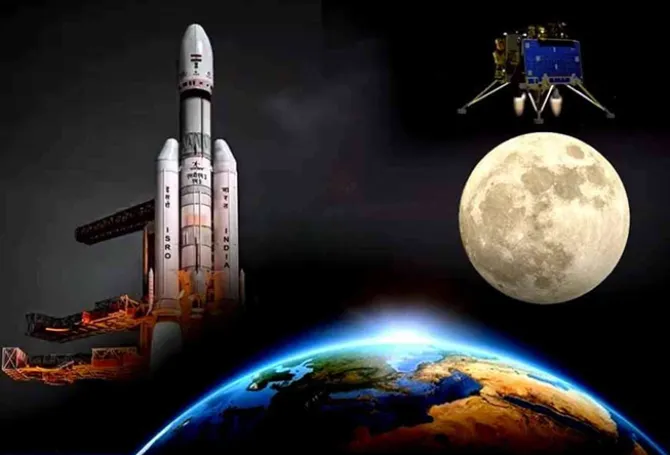-
CENTRES
Progammes & Centres
Location
There is a growing need for global governance of space technology. India, being one of the earliest and most successful spacefaring states, could play the role of a norm-shaper.

On 23 August 2023, the success of Chandrayaan-3 made India the fourth state to have a soft landing on the moon and the only one to reach its South Pole. It was launched on 14 July 2023 as a follow-up mission by the Indian Space Research Organisation (ISRO) to the Chandrayan-2. The goal of the Chandrayaan-3 was to develop and demonstrate new technologies required for interplanetary expeditions. This is evident as the Lander Module (LM), propulsion module and the rover, which were the three components of the mission, were developed indigenously. The mission’s success is the door of opportunities for future space interests. While India is steadily growing in the field, it also ensures the importance of cooperation, especially in governance. Prime Minister Narendra Modi, while congratulating the ISRO team, spoke on the organisation of ‘Space Technology in Governance’, highlighting the need for global governance of space technology amidst increasing space competition among states.
The new inventions and innovations in space technology have proven to be an instrument for enhancing the well-being of human beings.
Since launching the USSR’s Sputnik 1, the first artificial satellite, over the past six decades, the Earth-space frontier has drastically changed from a niche field to an area with multiple study programmes and research initiatives. The space sector, which initially had just the two superpowers, today witnesses competition from multiple states and private corporations. The new inventions and innovations in space technology have proven to be an instrument for enhancing the well-being of human beings. While exploring its possible applications continues, increasing competition and growing suspicions among states have raised discussions on the need for an able governance framework. Further, revisiting the existing governance mechanisms is necessary to check for their applicability in the current context.
Health is a critical sector that has found the application of space technologies particularly helpful. The advances in the field have improved techniques of observing and analysing factors like temperature and humidity, which has shown the potential for epidemiological applications. The combination of telemetry and electronic medical systems, known as spin-offs of space technology, has enhanced healthcare delivery, such as enabling links for remote consultations of healthcare specialists. With several infectious diseases prevalent across the globe, which in some cases dictate the course of the state’s development, having data on them is crucial for developing coping strategies and medicines. In this regard, combining data acquired from various satellites is vital in increasing the capacity to study the factors influencing and contributing to the spread of diseases. Further, it could identify hotspots of infectious diseases, which help delineate the areas for recovery measures. Thus enabling continuous disease monitoring to identify patterns in its geographic spread and predict areas vulnerable to future outbreaks.
With several infectious diseases prevalent across the globe, which in some cases dictate the course of the state’s development, having data on them is crucial for developing coping strategies and medicines.
Space technologies have also provided crucial data for risk reduction and disaster management. For example, the Indian authorities have used monitoring and early warning systems to evacuate vulnerable populations along the eastern coast of India prone to tropical cyclones. Thus, using space technology effectively minimises economic losses and casualties. Due to such applications, the United Nations (UN) has created Space-based Information for Disaster Management and Emergency Response (UN-SPIDER) and the UN Operational Satellite Applications Program (UNOSAT) to enable access to space-based information required during emergency response and disaster relief. While the applications of space technologies prove beneficial for society, the need for regulating their usage is also equally important.
The space sector has evolved enormously with crucial inputs for other fields like education, health, and economic development. Initially, when the era of space exploration started, it was limited to the space agencies of a few states. Further, there was a consensus about outer space being a global commons that could collectively benefit all, which the UN promoted by establishing the Committee on the Peaceful Uses of Outer Space (UN COPUOS). This notion led to multiple agreements and treaties, which came into existence mainly through the United Nations Office for Outer Space Affairs (UNOOSA). Some treaties include the Outer Space Treaty, Rescue Agreement, Liability Convention, Registration Convention, and Moon Agreement, often collectively called “five treaties on outer space”. However, these existing frameworks are criticised for being from the Cold War era and failing to consider the current geopolitical power transitions. While they continue to be the base for space governance, there is a need for a regulatory framework that addresses contemporary issues and ensures the effective use of space technologies for the welfare of society.
The Indian authorities have used monitoring and early warning systems to evacuate vulnerable populations along the eastern coast of India prone to tropical cyclones. Thus, using space technology effectively minimises economic losses and casualties.
The advancement in the field of outer space, accompanied by the increase in actors, has enabled the commercialisation of the application of space technologies. While the increase in number enables diversification, it raises concern about these ventures' effect on outer space's sustainability. Thus, a regulatory framework addressing emerging challenges, such as ownership rights, access to resources in space, and mitigation of the threat of space debris, is needed to reduce the friction among the states. It also acts as a platform to understand and track the proliferation of new technologies and limitations associated with their application. Engaging key stakeholders such as governments, national agencies, private payers, researchers, and academicians could ensure a smooth process as concerns related to the application of the technology and their societal impact can be effectively addressed. However, since the space sector is viewed as a domain not limited to any state's geographical and political boundaries, delineating domestic and international actions plays a central role in enabling multilateral cooperation and coordination. This also includes clarifying the ambiguity of the contribution of each actor in the current system. While drawing light on these issues is crucial, the efforts might not pay off if the international community fails to approach the issue collaboratively. Thus, while being an active player in the global governance of outer space, India could play a critical role in bringing the discussions to the table. India has remained active in global space governance and supported significant multilateral institutions and treaties, the most recent being the Artemis Accords, a US-led lunar cooperation and governance mechanism. Furthermore, India has successfully used such international platforms to gain expertise from other advanced states and share its knowledge and technological know-how for developing countries’ space program development. Thus, a cooperation-based approach is more practical as it will benefit states’ socioeconomic development.
India has remained active in global space governance and supported significant multilateral institutions and treaties, the most recent being the Artemis Accords, a US-led lunar cooperation and governance mechanism.
The existing global space governance framework has been criticised for being indifferent to advances in space and space technologies for decades. Thus, being one of the earliest and most successful spacefaring states, India could play the role of a norm-shaper while focusing on cooperation and appreciating the geopolitical importance of other players. While a cooperative approach is ideal, its success depends on the willingness of the significant global space powers to address the challenges that have derailed the decision-making on outer space and space technologies governance at the global level. Therefore, the 2022-23 UN working group for reducing space threats provides an opportunity to focus on contemporary issues related to the field and develop a binding regulatory framework based on consensus and cooperation between the states.
Kiran Bhatt is a Research Fellow at the Centre for Health Diplomacy, Department of Global Health, Prasanna School of Public Health Aniruddha Inamdar is a Research Fellow at the Centre for Health Diplomacy, Prasanna School of Public Health. Sanjay Pattanshetty, Head of the Department of Global Health Governance and Coordinator of Centre for Health Diplomacy, Prasanna School of Public Health.
The views expressed above belong to the author(s). ORF research and analyses now available on Telegram! Click here to access our curated content — blogs, longforms and interviews.

Kiran Bhatt is a Research Fellow at the Centre for Health Diplomacy, Department of Global Health Governance, Prasanna School of Public Health, Manipal Academy of ...
Read More +
Aniruddha Inamdar is a Research Fellow at the Centre for Health Diplomacy, Department of Global Health Governance, Prasanna School of Public Health, Manipal Academy of ...
Read More +
Dr. Sanjay M Pattanshetty is Head of theDepartment of Global Health Governance Prasanna School of Public Health Manipal Academy of Higher Education (MAHE) Manipal Karnataka ...
Read More +